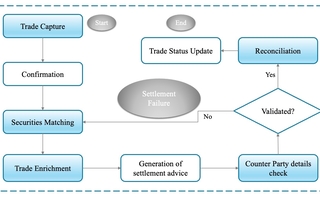Waters Wrap: ChatGPT, data officers, and reaching new frontiers
As banks clamp down on large language models like ChatGPT, Anthony says that CDOs can help firms experiment with these chatbots while developing the proper governance structures.

Need to know
Read more: As large language models that underpin the likes of ChatGPT and Bard come to market, vendors and trading firms are starting to see the benefits—and challenges—that open APIs provide. Click here.
For the layperson, tech evolution seemingly happens overnight, and this is especially true in the 21st century. Heading into 2007, Apple was basically a desktop/mainframe computer company; by 2010, it was the second largest mobile phone manufacturer; in three more years it would rise to No. 1. And that reign was short-lived thanks to Samsung. Now it is a dead heat. Your beloved flip-phone became a joke; and then it became cool again. The pace of change in the mobile phone market is dizzying.
Even for technologists in the capital markets, the shifts have been jarring and have changed paradigms in the matter of a few years, thanks largely to the evolution of the major cloud services providers. And it’s those same Big Tech cloud providers that have sprung forth the next great wave of tech hype—large language models (LLMs), the most notable of which is OpenAI’s ChatGPT.
Just a few years ago in the glossy pages of WatersTechnology magazine—we’re now online only—we were writing about the evolution of artificial intelligence, and its renaissance from an AI winter to a rebirthed spring. So-called “AI winters” are periods where little substantive progress in the field is made after a period of extreme hype. And like the seasons change, we’re seeing that term again.
ChatGPT was released on November 30, 2022. Once the holiday season haze melted away, executives at every company imaginable were talking about how this new LLM could revolutionize…well…everything. It wasn’t just engineers and technologists who were excited—people in sales, marketing, events, research, operations and certainly suits in senior management roles were all of a sudden talking about this cool new chatbot called ChatGPT. Like nerds.
What I think got lost along the way—and what we tried to explore with this article—is that LLMs on a commercial level are still quite nascent. There’s tremendous potential, but ChatGPT is still experimental…we’re all just helping to train this thing (and even teach it bad habits) while raising OpenAI’s—and, by extension, Microsoft’s—bottom line. At the start of February, Google released its LLM chatbot, dubbed Bard. And just like that—seemingly overnight—the race for LLM supremacy is on.
But the thing is, this isn’t an “overnight” evolution. It’s taken years (actually, decades) of development and advancement in the fields of natural language processing and deep learning, among others, to get here. As James Cham, a partner at investment firm Bloomberg Beta, told Wired, “We’ve had decades of great AI demos, but this is the first one where you give it to someone and they are really excited about the possibilities.” It’s accessible to non-programmers, but we’re certainly nowhere near nirvana.
But exploration is important. A while back we spoke with William Zeng, head of quantum research at Goldman Sachs. We asked him why it was important to experiment with quantum (in this case for a project to prove quantum advantage for derivatives pricing). After all, by 2020, “quantum fatigue”—the quantum equivalent of an AI winter—was setting in.
He said: “There are a lot of really smart people in this field, but the pond is still very small—we’re still in early days,” and the bank did not want to fall behind. Advancements in this field—while incremental—are rapid.
As Bloomberg (the media entity) reported last week, compliance departments at banks across Wall Street are clamping down on the use of ChatGPT (and, one would presume, other LLM chatbots that will hit the market). When dealing with AI oversight, it can be a delicate needle to thread. At the same time, though, in the highly-regulated world of finance, compliance departments have to be excruciatingly careful with the data being used—both data that’s entered into a chatbot, and how the information it spits out is used. But wholesale lockdowns are not the answer (so says, like, all of recorded human history).
In my opinion—and in the opinion of some others I recently spoke with—this is where a chief data officer can shine. As Max Bowie recently wrote, CDOs have struggled to articulate their ROI to the business. But it’s at the intersection of data governance and tech innovation that a CDO can shine.
Leave it to compliance, and the walls will come up. The chief information officer is likely too overwhelmed with the firm’s general tech and data strategy to develop a proper company policy. Same with the chief technology and operations officers. The chief innovation officer needs to be on the bleeding edge, but can’t be too constrained by red tape to explore. A chief information security officer’s input should certainly be considered, but a CISO has bigger fish to fry, in the forms of phishing scams and ransomware attacks. And the chief investment officer/head of equities trading/a fixed-income portfolio manager is definitely not where you want oversight residing.
The CDO role is still relatively new and evolving…just like LLMs. Oversight requires a proper blend of data governance and knowledge of company procedures for the imbibing of data; an understanding of the challenges of things like data quality, lineage, timeliness, accuracy, and completeness; and an understanding of new tools and technologies to take in, distribute and utilize data is a must.
While new tech frontiers don’t appear overnight, the incremental evolution of tech is happening at a (startlingly) rapid pace. For an enterprising CDO, this could usher in the dawn of a new day.
Think I’m way off? Let me know: anthony.malakian@infoprodigital.com.
Only users who have a paid subscription or are part of a corporate subscription are able to print or copy content.
To access these options, along with all other subscription benefits, please contact info@waterstechnology.com or view our subscription options here: http://subscriptions.waterstechnology.com/subscribe
You are currently unable to print this content. Please contact info@waterstechnology.com to find out more.
You are currently unable to copy this content. Please contact info@waterstechnology.com to find out more.
Copyright Infopro Digital Limited. All rights reserved.
You may share this content using our article tools. Printing this content is for the sole use of the Authorised User (named subscriber), as outlined in our terms and conditions - https://www.infopro-insight.com/terms-conditions/insight-subscriptions/
If you would like to purchase additional rights please email info@waterstechnology.com
Copyright Infopro Digital Limited. All rights reserved.
You may share this content using our article tools. Copying this content is for the sole use of the Authorised User (named subscriber), as outlined in our terms and conditions - https://www.infopro-insight.com/terms-conditions/insight-subscriptions/
If you would like to purchase additional rights please email info@waterstechnology.com
More on Emerging Technologies
Quants look to language models to predict market impact
Oxford-Man Institute says LLM-type engine that ‘reads’ order-book messages could help improve execution
The IMD Wrap: Talkin’ ’bout my generation
As a Gen-Xer, Max tells GenAI to get off his lawn—after it's mowed it, watered it and trimmed the shrubs so he can sit back and enjoy it.
This Week: Delta Capita/SSimple, BNY Mellon, DTCC, Broadridge, and more
A summary of the latest financial technology news.
Waters Wavelength Podcast: The issue with corporate actions
Yogita Mehta from SIX joins to discuss the biggest challenges firms face when dealing with corporate actions.
JP Morgan pulls plug on deep learning model for FX algos
The bank has turned to less complex models that are easier to explain to clients.
LSEG-Microsoft products on track for 2024 release
The exchange’s to-do list includes embedding its data, analytics, and workflows in the Microsoft Teams and productivity suite.
Data catalog competition heats up as spending cools
Data catalogs represent a big step toward a shopping experience in the style of Amazon.com or iTunes for market data management and procurement. Here, we take a look at the key players in this space, old and new.
Harnessing generative AI to address security settlement challenges
A new paper from IBM researchers explores settlement challenges and looks at how generative AI can, among other things, identify the underlying cause of an issue and rectify the errors.








